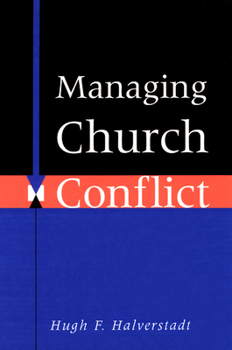Managing Church Conflict
Select Format
Select Condition 
Book Overview
In this instructive book, Hugh Halverstadt advocates a Christian vision of shalom for an ethical process of conflict management. He shows how respectfulness, assertiveness, accountability, and a focus... This description may be from another edition of this product.
Format:Paperback
Language:English
ISBN:0664251854
ISBN13:9780664251857
Release Date:January 1991
Publisher:Westminster John Knox Press
Length:236 Pages
Weight:0.95 lbs.
Dimensions:0.5" x 6.0" x 9.1"
Customer Reviews
4 ratings
Useful
Published by Thriftbooks.com User , 14 years ago
I haven't completely read this yet but will find it usefull for my use as a minister.
The Process of the Flowchart is Great
Published by Thriftbooks.com User , 15 years ago
This was another excellent book on the topic of church fights. It is the second book that I have read for the Doctor of Ministry program. This book provides a flowchart that is easy to understand to navigate through the process of healing conflict within a congregation. The book has great insight into some of the "gut theologies" within churches. The first section of the book about these erroneous views about church problems is worth the weight of the book. The next great section is concerning Christian assertiveness. This is a misunderstood idea within the church. People have numerous false views on how a Christian is to act. Much of these views are from culture and not the Bible. This is another section that is worth the price of the book. The book continues with more of an academic explanation of traveling through the conflict in a healthy way. This is not the best book on this, certainly not a first to read book on conflict but is for those who are more mature in the process of healing a church. Nevertheless, the book is worth the money for those who have a passion to be a peacekeeper or to help a congregation resolve a conflict. There will be a extensive review in the comment section tomorrow as well.
A Standard Handbook for Managing Church Conflict
Published by Thriftbooks.com User , 17 years ago
The key strength of this book is that it adopts a systems approach in dealing with church conflict, and advocates mobilising community resources in conflict resolution. Bystanders are not passive. They should hold the parties involved accountable in working towards a win/win resolution and to "fight fair". The flow chart also provides an excellent framework, not only to deal with the conflict situation, but also to build on one's conflict management skills through other readings or training. For example, another book by Charles Cosgrove and Dennis Hatfield, entitled "Church Conflict: The Hidden Systems Behind the Fights," provides more insights into the contextual factors in the conflict that would fit neatly into Halverstadt's overall framework. The framework serves as an excellent structure for further development and learning. One weakness of the book actually lies in its theological exposition, especially in the early chapters where the biblical foundation is being explained. The underlying theological perspective does not seem to square with current evangelical theological thinking, even though the author claims to be a Presbyterian. Nevertheless, this is an indispensible book to have for those who wish to read more about this area. I use it over the last four years as a standard text in a Bible college class that I teach. The book is a product of the author's experience in dealing with denomination-wide and church-wide conflicts within the Presbyterian Church (PCUSA) over the years.
Digest This Book and Strengthen Your Ministry!
Published by Thriftbooks.com User , 22 years ago
First published in 1991, this has become a standard work on understanding church conflict. It is in a different category than Ken Sande's "The Peacemaker" (also an excellent book). Sande writes to equip individual Christians to follow Christ in resolving interpersonal conflicts. Halverstadt, however, addresses the more complex dynamics of congregational conflict. Halverstadt's vision for peaceful churches is based on God's shalom, and he integrates this theology with insights from family systems theory and organizational development. The book is organized according to an in-depth Flow Chart for Managing Church Conflict that presents almost every conceivable conflict scenario and suggests detailed procedures. This is a book of high density, but there is no substitute. It is required reading for anyone who wants to understand congregational conflict.





